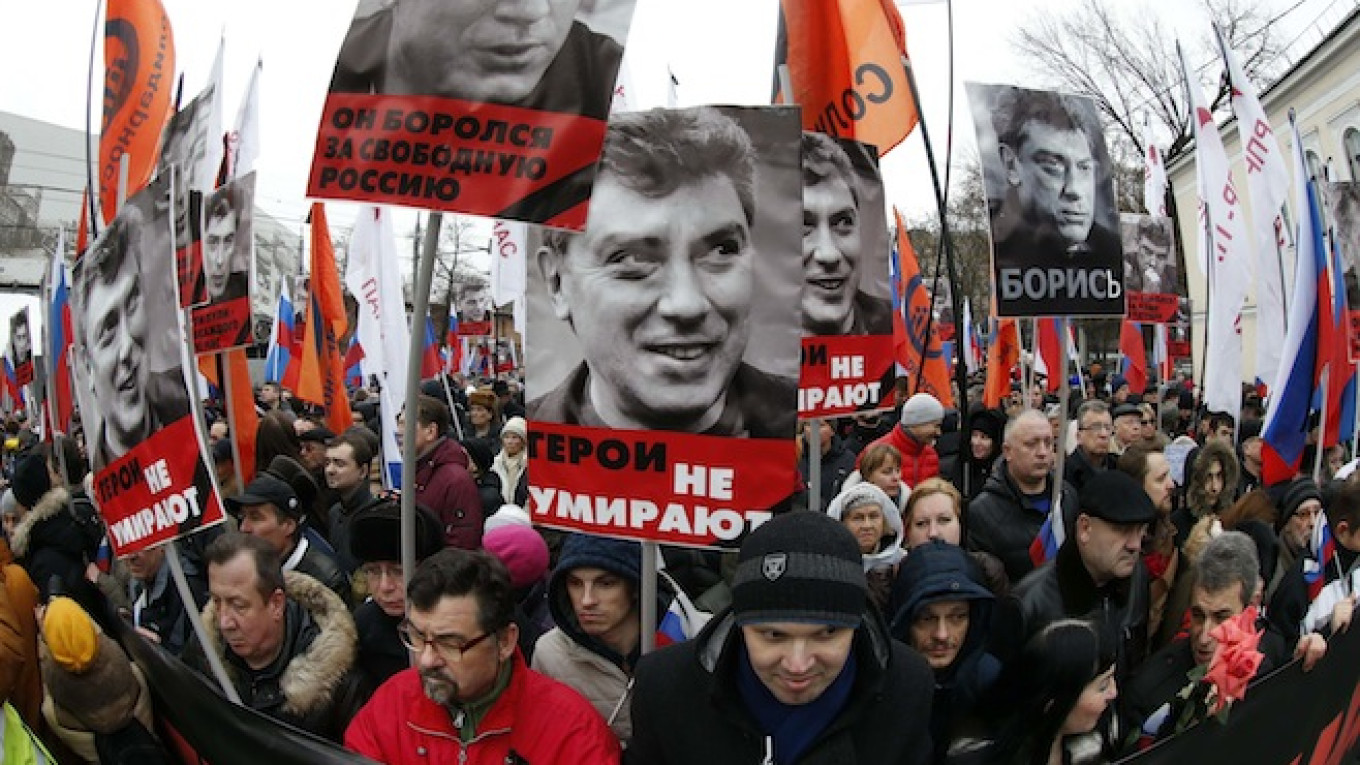Since Russian opposition figure Boris Nemtsov was killed, contradictory accounts have emerged of what happened, fuelling talk of a conflict between rival groups inside the system of power built by President Vladimir Putin.
Below is a timeline of events in the 13 days since the shooting:
* Boris Nemtsov was shot dead at 11:31 p.m MSK (20:31 GMT) on Friday, Feb. 27 as he walked home past the Kremlin with his girlfriend.
* A day later, the state-run Rossiya television station released grainy footage, apparently from closed circuit TV cameras, of a white car driving near the crime scene. It said the vehicle was likely to have been used by the killers.
* TV-Tsentr, a television station controlled by the Moscow city government, headed by a Putin loyalist, then released footage from the scene which showed a much more complex operation. It appeared to show a killer arriving on foot, disappearing behind a snow-clearing lorry at the exact moment it passed Nemtsov, then getting into a vehicle.
* On March 8, investigators announced that they had charged two men with involvement in the killing, one of them a former senior police officer in Chechnya, and were holding three others as suspects. The police officer, Zaur Dadayev, admitted to investigators that he had been involved in the killing, the judge at his preliminary hearing said.
* Later the same day, Chechen leader Ramzan Kadyrov said on his Instagram account that he knew Dadayev, and believed he was angered that Nemtsov had spoken out in defence of Charlie Hebdo, the French news magazine that had published satirical cartoons of the Prophet Mohammad. It was the strongest assertion to date about a motive for Nemtsov's killing, and was widely circulated in the state-controlled media.
* On March 10, this version was challenged by the publication of surveillance photographs purporting to show Dadayev in a car near Nemtsov's Moscow apartment in autumn last year. That was months before Nemtsov spoke out in defense of Charlie Hebdo. "If we suppose that the suspects were already back then trailing Nemtsov, the main motive is ruled out," the newspaper, Moskovsky Komsomolets, wrote in a comment to accompany the photographs. The newspaper is not known for its pro-opposition leanings. It did not say where it obtained the photographs.
* Dadayev has now retracted his confession, saying he had only admitted his guilt after being promised that the authorities would then free one of the other suspects.
* A member of the Kremlin's advisory council on human rights who visited Dadayev at Moscow's Lefortovo prison said on March 11 the ex-policeman had probably been tortured while in detention.
* The Investigative Committee, the state body in charge of investigating the killing, has remained silent on the theory that Nemtsov was killed for defending satire of the Prophet. In a statement on Wednesday, it said it could not disclose any information about its lines of inquiry because this could harm the investigation.
* However, details of one line of inquiry have appeared. Investigators have been interviewing Nemtsov's aides and searching his offices and an apartment in the provincial city of Yaroslavl, two of the aides said.
Nemtsov, who sat in the regional parliament, last year accused the deputy governor, Aleksander Senin, of a conflict of interests, alleging the local authorities awarded a contract to a pharmaceutical firm run by Senin's wife.
Senin denied any wrongdoing but he stepped down from his post on June 11 last year, saying the affair was damaging the reputation of the regional government. He later sued Nemtsov for defamation, but lost, according to local media reports.
It was not clear how the Yaroslavl line of inquiry fits in with the investigation, or if it is still active. However, it demonstrates that investigators have been actively pursuing more than one theory about the killing.
A Message from The Moscow Times:
Dear readers,
We are facing unprecedented challenges. Russia's Prosecutor General's Office has designated The Moscow Times as an "undesirable" organization, criminalizing our work and putting our staff at risk of prosecution. This follows our earlier unjust labeling as a "foreign agent."
These actions are direct attempts to silence independent journalism in Russia. The authorities claim our work "discredits the decisions of the Russian leadership." We see things differently: we strive to provide accurate, unbiased reporting on Russia.
We, the journalists of The Moscow Times, refuse to be silenced. But to continue our work, we need your help.
Your support, no matter how small, makes a world of difference. If you can, please support us monthly starting from just $2. It's quick to set up, and every contribution makes a significant impact.
By supporting The Moscow Times, you're defending open, independent journalism in the face of repression. Thank you for standing with us.
Remind me later.


